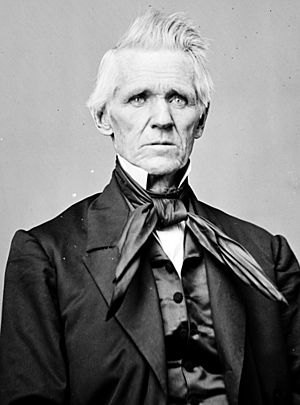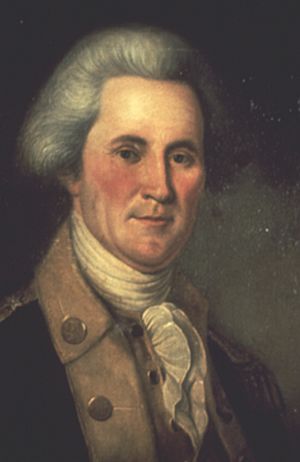Austin Augustus King facts for kids
Quick facts for kids
Austin King
|
|
|---|---|
 |
|
| Member of the U.S. House of Representatives from Missouri's 6th district |
|
| In office March 4, 1863 – March 3, 1865 |
|
| Preceded by | John S. Phelps |
| Succeeded by | Robert T. Van Horn |
| 10th Governor of Missouri | |
| In office November 20, 1848 – January 3, 1853 |
|
| Lieutenant | Thomas Lawson Price |
| Preceded by | John Cummins Edwards |
| Succeeded by | Sterling Price |
| Member of the Missouri House of Representatives | |
| In office 1834–1837 |
|
| Personal details | |
| Born | September 21, 1802 Sullivan County, Tennessee, U.S. |
| Died | April 22, 1870 (aged 67) St. Louis, Missouri, U.S. |
| Political party | Democratic, Unionist (1862-65) |
| Spouses | Nancy Roberts (1827–1857) Martha Woodson (1858–1870) |
| Children | 3 daughters 6 sons |
Austin Augustus King (born September 21, 1802 – died April 22, 1870) was an important American lawyer, politician, and military officer. He was also known as Austin A. King or just Austin King. As a member of the Democratic Party, he served as the tenth Governor of Missouri. He also represented Missouri for one term in the U.S. Congress.
Contents
Early Life and Education
Austin King was born in Sullivan County, Tennessee. His parents were Walter and Nancy (Sevier) King. He was one of eleven children in his family. His mother, Nancy, was the daughter of John Sevier, a famous military leader and politician from Tennessee.
Austin grew up helping his father on their farm. He went to schools in his home state. Later, he studied law with an attorney, which was a common way to learn law back then. He also took private lessons in Latin and Greek. In 1822, Austin King became a lawyer in Tennessee. He worked in the Jackson, Tennessee area until 1830. Then, he moved to Columbia, in Boone County, Missouri.
In Columbia, King started a successful law business. He traveled around central and eastern Missouri, often by horse or riverboat, to help people with legal issues. Soon after arriving, he also became involved in Missouri politics. Like many in his family, he also served in the military. In 1832, during the Black Hawk War, King became a colonel in the Missouri State Militia.
Political Journey
In 1834, Austin King was elected to the Missouri House of Representatives. He served two terms there. He was known for strongly supporting better education in Missouri. In 1836, he suggested creating a college to train teachers for the state's schools. This idea helped start the concept of "Normal schools" in Missouri, which were schools specifically for teacher training. King also supported colleges in Richmond, Missouri, and Columbia College. He also helped found the "Columbia Female Academy" in 1833, which later became Stephens College.
Serving as a Judge
In 1837, King and his family moved to Ray County, Missouri. He was appointed a judge for the Missouri Fifth Circuit Court. He held this important position until 1848.
During his time as a judge, he oversaw a trial involving Joseph Smith. Smith was the founder of the Latter Day Saint movement. This trial happened in 1838 in Richmond, Missouri. Smith and many of his followers had surrendered after a conflict. Judge King held an inquiry and released most of the followers. However, Smith and a few others were held in Liberty Jail in Clay County, Missouri. Later, Smith was able to leave custody and went to Illinois.
While he was a judge, King stayed active in politics. He strongly supported Martin Van Buren for president in 1840. In 1844, King tried to become the Democratic Party's candidate for Missouri Governor. He lost by a small amount to John Cummins Edwards.
Leading as Governor
Finally, in 1848, Austin King became Governor of Missouri. He was respected by other Democrats. He easily won the nomination and then defeated James S. Rollins in the election. King's time as governor was a period of great growth for Missouri. In his first year, 142 new companies were allowed to start in the state.
King was careful with money, but he saw the benefits of expanding train services. In 1850, he suggested that the state provide $3.5 million to fund two train projects. Other important projects during his time included:
- Draining swampy lands.
- Building new roads.
- Establishing a state hospital for people with mental illness.
- Creating a school for the deaf.
- Opening a home for the blind.
One thing King hoped for but didn't achieve was creating a state Department of Education. He also wanted more funding for the state university. By the time he left office, eight new counties had been created in Missouri.
After being governor, King tried to get elected to the U.S. Congress in 1852. He lost because the Democratic Party was divided. This allowed a different party's candidate, Mordecai Oliver, to win. King then returned to his law practice.
In 1855, King attended a meeting of Missouri slave owners. They discussed states' rights and supported slavery in the Kansas Territory. However, King later disagreed with people from Missouri crossing the border to vote on the Kansas Lecompton Constitution.
In 1860, King attended the Democratic National Convention. He supported Stephen A. Douglas for president. King believed Douglas could help keep the country together. The next year, as Missouri faced the crisis of states leaving the Union, King spoke out for staying in the Union. He supported the temporary government led by Hamilton Rowan Gamble. In 1862, he became a circuit judge again for about a year. Then, he ran for U.S. Congress once more.
Serving in Congress
King succeeded in his second attempt to serve in Congress, just like his grandfather Sevier. On November 4, 1862, he ran as a Unionist. He won with 45 percent of the vote. King served as the Representative for Missouri's 6th congressional district from March 4, 1863, to March 3, 1865.
During his time in Congress, important laws were passed, such as:
- The Coinage Act of 1864.
- The establishment of the Freedmen's Bureau.
- The passage of the Thirteenth Amendment to the United States Constitution, which ended slavery.
King wanted to be reelected in 1864, but he lost. He came in third place. After this loss, King returned to Missouri. He continued his law practice for the rest of his life. Austin King passed away on April 22, 1870, in St. Louis, Missouri. He was buried in the cemetery in Richmond, Ray County, Missouri.
Family Life
Austin King was married two times. His first wife was Nancy Harris Roberts. They married in Jackson, Tennessee, on May 13, 1828. Nancy passed away in 1857. The next year, on August 10, 1858, he married Martha Anthony Woodson in Kingston, Missouri.
King had a total of nine children with his two wives. With his first wife, he had six sons: Walter, William Augustus, Edward Livingston, Henry, Thomas Benton, and Austin Augustus Jr. He also had one daughter, Melvina Elizabeth. With his second wife, he had two daughters, Mary Bell and Nannie. His son Henry died young, around age six, in 1840.
His son, Austin A. King, Jr., was a military officer who supported the Union during the Civil War. He became a colonel in the Missouri Volunteer Cavalry.
Legacy
The town of Kingston, Missouri is named after Austin King.
 | Anna J. Cooper |
 | Mary McLeod Bethune |
 | Lillie Mae Bradford |


